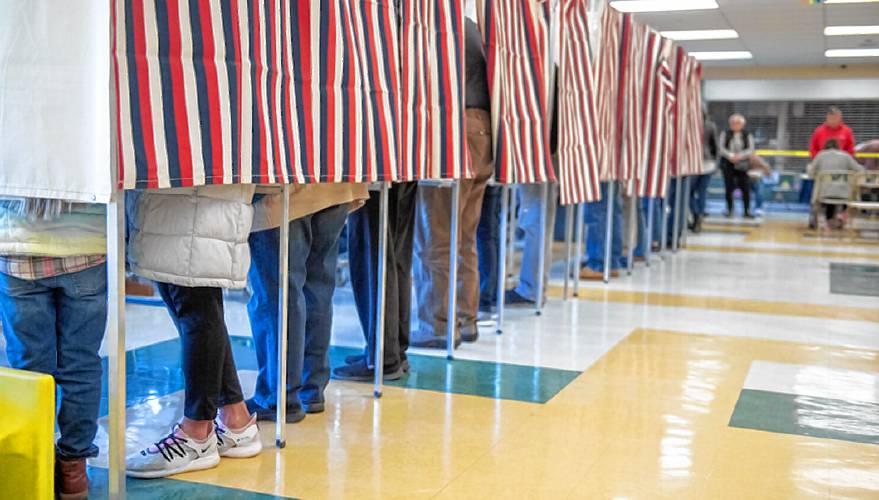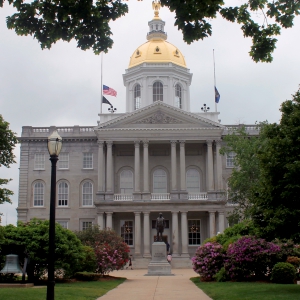As lawmakers contemplate requiring voter ID, one organization is ready to help

Kate Brindley—New Hampshire Bulletin
| Published: 04-25-2024 9:48 AM |
Sue Nastasi lost her birth certificate years ago. “Beats me where it is,” she said.
But getting it back is not a simple matter. Nastasi was born in Elizabeth, New Jersey, in a hospital that doesn’t exist any more, under a different name, she said. She was taken into New Jersey family services at 4 months old after neglect from her parents, and she emerged with a new family and a new name.
Over the decades, Nastasi has kept her passport up to date, including during and after a marriage in which she had a different surname, she told New Hampshire lawmakers Tuesday. But she has had no luck so far in obtaining a birth certificate from her home state – either being told there is no record or receiving no response.
Now, Nastasi, a supervisor of the checklist in Rollinsford who helps check in voters on Election Day, says a proposed law to require a birth certificate and driver’s license in order to register to vote in New Hampshire would directly affect her right to vote.
“Registering to vote on Election Day is known by Granite Staters and used often because town hall hours are not public friendly,” she said at a hearing Tuesday in the Senate Election and Municipal Affairs Committee. “The public wants to vote and can be forgetful to carry identification on Election Day.”
As lawmakers weigh the bill, House Bill 1569, one national organization is gearing up to help voters like Nastasi should it become law.
VoteRiders, a California-based nonprofit, focuses on helping voters across the country understand their state’s voter identification laws. And the organization has another goal: placing residents on a path to getting the documentation they need in order to vote. The group provides services – including financial help to those who need it – in all 50 states and has staff members in eight states with difficult voter identification laws.
It is unclear whether New Hampshire’s proposed voter identification bill will become law. The legislation passed the New Hampshire House and could pass the Republican-led Senate in the coming weeks, but Gov. Chris Sununu has indicated he is not interested in signing it. “Our system works very well, so I’m not looking to make any changes,” he said in March, though he did not clarify whether he would veto it.
Article continues after...
Yesterday's Most Read Articles
 Update: Reactions for, against the more than 100 arrested at Dartmouth, UNH
Update: Reactions for, against the more than 100 arrested at Dartmouth, UNH
 Franklin police arrest man after accidental shooting Wednesday
Franklin police arrest man after accidental shooting Wednesday
 Opinion: New Hampshire, it’s time to acknowledge the stories of suffering
Opinion: New Hampshire, it’s time to acknowledge the stories of suffering
 Baseball: Merrimack Valley now 6-1 following wild game at Pembroke Academy
Baseball: Merrimack Valley now 6-1 following wild game at Pembroke Academy
 Food insecurity on the rise in N.H.
Food insecurity on the rise in N.H.
 Concord High graduate leads Pro-Palestine protests at Brown Univeristy
Concord High graduate leads Pro-Palestine protests at Brown Univeristy
But if it did become law, Ceridwen Cherry, legal director at VoteRiders, says significant outreach to voters would be required.
“This proposal is very severe compared to what we see in other states,” Cherry said.
HB 1569 would eliminate the voter affidavit, the document that allows people to vote and register to vote on Election Day by signing a sworn statement that they are a legal citizen and resident.
To Rep. Bob Lynn, a Windham Republican and the bill’s sponsor, the bill is simply intended to remove exceptions that he says weaken confidence in state elections.
New Hampshire already does require voter ID to vote, but the affidavit allows those who show up at the polls without that documentation to state on penalty of perjury that they are who they say they are. Lynn and other supporters of the bill say that affidavit is not enough because it still allows someone to vote fraudulently. Even if the voter is later caught and prosecuted, their vote will still have been counted and still could have influenced the election, supporters say.
“If you want to vote, you have to provide proof of certain things,” Lynn said at a hearing of the Senate Election Law Tuesday, citing a voter’s citizenship, domicile, age, and identity. “There really should be no exceptions to that.”
Lynn acknowledges that the number of recorded voter fraud instances in New Hampshire is low. “Do I think there’s a huge issue of voter fraud in New Hampshire? No I don’t,” he testified. But he argues that is because most voters already show up with the same identification required in his bill. If more people showed up without identification and used affidavits, as is allowed now, the instances of wrongful voting could be higher, Lynn argued.
Other supporters of the bill agree. Rep. Ross Berry, the chairman of the House Election Law Committee, testified to the Senate committee that most voters already comply with the proposed law. “Most Granite Staters already think that something like this is the law,” he said. “They actually already think it’s kind of like this, that if you don’t have your ID you’re not going to vote.”
But voting rights advocates say the law would affect people who either don’t have documentation or who have lost their documentation and don’t have the time to replace it before Election Day.
A national survey by VoteRiders in partnership with the University of Maryland and the Brennan Center for Justice suggests that voter identification requirements could particularly affect younger people and people of color.
Nine percent of voting-aged Americans – or 21 million people – do not have a non-expired drivers license, the survey found. And another 12%, or 28.6 million, have a current license that does not reflect either their current name or their current address.
Among people aged 18 to 24, 41% do not have an ID with their current name or address, and 38% of those between 25 and 29, compared to 24% for those 30-49 and 11% for those over 65, the survey found.
And voting-aged people of color were 3.7 times more likely to not have an up-to-date form of identification than their white counterparts, the survey found.
New Hampshire’s bill creates one of the strictest requirements of voter identification in the country, Cherry said. While a number of states require identification to register and to vote, HB 1569 would require identification and a birth certificate. And it would require those documents every time a voter registered at a new polling place, even if they moved to another ward in the same city.
“If this were to go into effect, that’s going to trip up a lot of people,” Cherry said.
In recent years, state voter ID laws have cropped up in two major waves. The first was in the early 2010s, after the 2008 U.S. Supreme Court decision of Crawford v. Marion County Election Board, in which the court upheld a voter ID law in Indiana, paving the way for other states to pass similar laws. The second was after the 2020 presidential election, in which Joe Biden defeated incumbent Donald Trump, and after Trump falsely claimed the election had been stolen.
VoteRiders, which was formed in 2012 in the wake of the first wave of new identification laws, has received a surge of new donations in response to the latest round of laws. And Cherry says they have also seen a corresponding uptick in the number of people who are reaching out for help securing documentation. A lot of that increase happened in fall 2023, she said.
In most states that have voter ID requirements to register, the voter ID is only required upon initial registration, and proving your citizenship is required only once, too. “Especially if it’s something like your citizenship, that’s not going to change when you move,” Cherry said.
Tracking down a birth certificate can be more difficult than obtaining a driver’s license, particularly when a voter was born in a different state, Cherry noted. Some voters may have changed their last names after marriage, their gender marker on their driver’s license, or their first name after a gender transition. Some voters may not have birth certificates to begin with.
The new law could also affect military service members and college students, who likely will not have easy access to their birth certificates, critics say.
Reaching out to the people who might be most affected by a voter ID is a tricky art, Cherry said. Some states choose to make it easier, by comparing their voter rolls to motor vehicle records to see which registered voters do not have driver’s licenses. Given that a driver’s license isn’t the only form of ID, the list isn’t exact, but it gives VoteRiders a head start in contacting people.
In states that don’t do that comparison, finding voters is harder. Some reach out proactively to the organization. In other cases, VoteRiders must wait until after the election passes and use state records to see how many people did not vote because of a lack of identification.
The organization will typically text people to offer help with identification, but many times the number is inaccurate or inactive. Often, the process begins when voters reach out to VoteRiders.
Even as more states have passed voter identification laws, political parties have been slow to make similar attempts to help prospective voters with their documentation, Cherry has observed. That may be driven by a basic calculation: It is more costly and complicated for campaigns to pursue voters who don’t have identification than to convince those who do to show up.
“The reality is that it costs money,” she said.
Supporters of the bill say they understand the process might be difficult, and that people might not have the documents ready in time to vote. But they argue those people should have taken steps to obtain those documents ahead of Election Day.
“If somebody didn’t have an identification, but they could get an identification … and they simply hadn’t done it, I don’t think that that would be a basis for them to say, ‘Well, I couldn’t register,’” Lynn said Tuesday.


 House passes bill to raise minimum marriage age to 18, sending it to governor
House passes bill to raise minimum marriage age to 18, sending it to governor Charities will not have to pay rent to casinos under new law
Charities will not have to pay rent to casinos under new law Sununu says he’ll support Trump even if he’s convicted
Sununu says he’ll support Trump even if he’s convicted NH mayors want more help from state on homelessness prevention funds
NH mayors want more help from state on homelessness prevention funds
